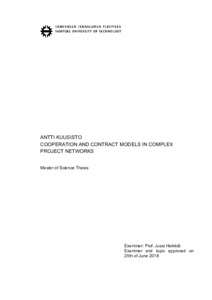Cooperation and contract models in complex project networks
Kuusisto, Antti (2018)
Kuusisto, Antti
2018
Tuotantotalous
Talouden ja rakentamisen tiedekunta - Faculty of Business and Built Environment
This publication is copyrighted. You may download, display and print it for Your own personal use. Commercial use is prohibited.
Hyväksymispäivämäärä
2018-10-03
Julkaisun pysyvä osoite on
https://urn.fi/URN:NBN:fi:tty-201810032367
https://urn.fi/URN:NBN:fi:tty-201810032367
Tiivistelmä
This thesis examined cooperation and contract models in complex project networks. The motivation to conduct this research originated from challenging projects that had included struggles with contractor cooperation and project execution. Additionally, the target company of this thesis had experienced that currently used contracts do not always encourage contractors to be cooperative and motivated to meet the mutual project objectives. Therefore, the research objective was determined to find practices that could enhance overall performance in project execution by improving contractor cooperation and selecting the most appropriate contract models for contractors.
This research was conducted as a case study. Research process consisted of analyzing scientific theory, examining target company´s case materials, conducting interviews, analyzing the collected research data and suggesting improvements for future practice. The selected six projects consisted of successful and challenging projects, which enabled answering research questions in a comprehensive fashion. Two persons were selected from each project and thus 12 semi-structured interviews were conducted. By comparing scientific theory and empirical material, answers for the research questions were formed.
Research results emphasize the importance of contractor cooperation and suitability of the contract model on the success of project execution. Contractor cooperation in project network is improved by using familiar contractors, pursuing early planning together and using financial drivers. However, information sharing is more dependent on the selected contract model. Evaluated contract models in this research were fixed price contract, unit price contract, cost-reimbursable contract, open book policy and alliance model. Analysis regarding alternative contract models shows that the currently used price-oriented contracts do not ensure high level contractor cooperation consistently, which emphasizes the need of using cooperation-enhancing contract models. Implementing contract models into practice should consider contractor evaluation, early planning, providing drivers for cooperation, using relational governance methods in project execution and evaluating project thoroughly after completion. This research shows that implementing these factors is more likely with cooperation-enhancing contract models than the currently used price-based contract models.
This research was conducted as a case study. Research process consisted of analyzing scientific theory, examining target company´s case materials, conducting interviews, analyzing the collected research data and suggesting improvements for future practice. The selected six projects consisted of successful and challenging projects, which enabled answering research questions in a comprehensive fashion. Two persons were selected from each project and thus 12 semi-structured interviews were conducted. By comparing scientific theory and empirical material, answers for the research questions were formed.
Research results emphasize the importance of contractor cooperation and suitability of the contract model on the success of project execution. Contractor cooperation in project network is improved by using familiar contractors, pursuing early planning together and using financial drivers. However, information sharing is more dependent on the selected contract model. Evaluated contract models in this research were fixed price contract, unit price contract, cost-reimbursable contract, open book policy and alliance model. Analysis regarding alternative contract models shows that the currently used price-oriented contracts do not ensure high level contractor cooperation consistently, which emphasizes the need of using cooperation-enhancing contract models. Implementing contract models into practice should consider contractor evaluation, early planning, providing drivers for cooperation, using relational governance methods in project execution and evaluating project thoroughly after completion. This research shows that implementing these factors is more likely with cooperation-enhancing contract models than the currently used price-based contract models.
